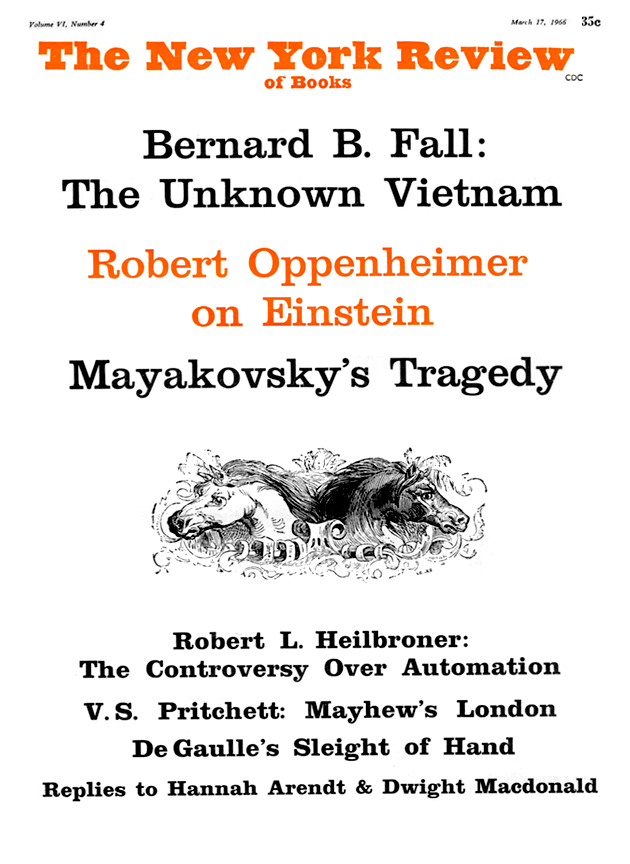In response to:
"The Formidable Dr. Robinson": A Reply from the January 20, 1966 issue
To the Editors:
In her reply to Walter Laqueur in the NYR (Jan. 20), Hannah Arendt writes of the conduct of the European rabbinate during the catastrophe as a disturbing problem first raised by her critic, Dr. Robinson, which she herself “had been careful not to raise because it was not raised at the [Eichmann] trial and therefore was not my business.” Later she makes it clear that in her eyes, at least, it is a problem that calls for investigation by independent minds: “the reporters, the historians and finally the poets”…”the men who stand guard over the facts.” Yet she is willing, in advance of such a study of the facts, to state a conclusion, and it is as follows: “It seems that there was not one rabbi who did what Dompropst Bernhard Lichtenberg, a Catholic priest, or Propst Heinrich Grüber, a Protestant minister, had tried to do—to volunteer for deportation.”
How does Hannah Arendt know what each and every rabbi did? Has she looked into the behavior of the hundreds of rabbis who perished in Hitler’s gas chambers and camps? Besides, what would it have meant for a rabbi or any Jew, for that matter, to volunteer for deportation at a time when all Jews were marked for destruction? Were the rabbis’ circumstances and relations to their helpless flock like those of the two Christians? Were the latter faced by the same dilemmas as the rabbis who were often caught between impossible choices, whether in their own actions or in advising others? Does she regard as untrue to their religious calling and morally inferior to the exceptional priest and minister those rabbis who chose to accompany their congregations and died with them, when they had the chance to escape? Has she forgotten Rabbi Leo Baeck who returned from abroad in order to be with his persecuted people in Berlin and then in a concentration camp? In his letter to Hannah Arendt in Encounter (Jan., 1964) Gershom Scholem has written of the rabbi of Piotrkov who, knowing what awaited him, “went with his flock to Treblinka—although he had previously called on them to run away, and his flock had called on him to do likewise.” When the last three remaining rabbis of Warsaw were offered refuge together with their families by the Court of the Catholic Bishops in that city, they refused to leave their doomed people; two of the rabbis were killed by the Nazis (Phillip Friedman, Martyrs and Fighters, 1954, pp. 172, 173).
I do not cite these reports to defend the rabbinate as a group. No doubt some rabbis behaved badly, like that Chief Rabbi of Rome who found refuge in the Vatican during the Nazi persecutions and was rejected by his people when he returned to the synagogue at a safer time; he became eventually a Catholic convert.
To be sure, Hannah Arendt places before her ruthless generalization an “it seems.” In this delicate matter the cautionary words do her no credit as an historian or moralist.
Meyer Schapiro
New York City
This Issue
March 17, 1966


